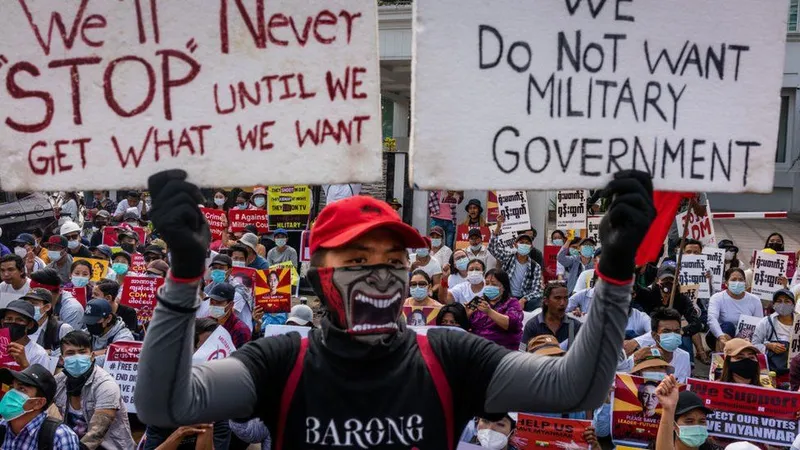Awaiting a pro-people regime for Myanmar
- By: Web Master
- | Date: 15 October 2024
- | Viewer: 323
Nava Thakuria,
the Narinjara News, 14 October 2024
India’s eastern neighbour Myanmar (also known as Burma and
Brahmadesh) today faces a civil war following a military coup on 1 February
2021, which was orchestrated by General Min Aung Hlaing to dethrone
democratically elected Aung San Suu Kyi’s National League for Democracy (NLD)
government in Naypyitaw.
The Buddhist majority nation is still under military rule
even though the dictators are facing intensifying protest outrages across
the south Asian country. Lately the anti-junta agitation turned violent where
the civilians had also taken arms to their hands to stimulate the resistance
forces carried out by various minority armed outfits.
They have systematically targeted the armed forces and their close relatives in
response to military atrocities on the Burmese civilians. Since the military
coup, over 5,500 civilians were killed, nearly 27,000 were arrested and
more than 3.3 million have been displaced.
The junta soldiers created a reign of terror with relentless
airstrikes on populated areas, setting many villages and urban localities on
fire across the country of 55 million people. But it has not deterred the
resistance forces from attacking the military bases in many localities and many
towns had already gone under the control of armed groups.
Many bases were even abandoned by the soldiers and some
soldiers even joined the anti-junta forces. A number of towns, precisely
bordering India, had gone under the control of armed groups.
Even though the junta has gradually lost control over the entire land and its
people, it plans for a national election by next year.
The junta-controlled Union Election Commission also already
started preliminary preparations for the polls including a countrywide census.
However, the electoral process in the ethnically-diverged
country remains doubtful since its independence in 1948. The powerful armed
forces often dictate the political leadership where the military-drafted 2008
Constitution made the situation more critical for the pro-democracy activists,
as it reserved a sizable number of seats in the Parliament and regional
assemblies for the military persons and their associates.
Amending the Constitution still becomes difficult as the country continues to
be ruled by the junta by different batches from time to time.
Unless there is a crack in the military fraternity and their
political standing, Myanmar will not be able to modify the Constitution and
hence it may not be possible to conduct a free, fair and participatory
election both in national and regional levels. So a free, fair and
participatory election to form a stable & progressive regime in the
poverty-stricken country under the ill-designed Constitution cannot be expected
at this moment.
Progressive Voice, an umbrella organization of pro-democracy civil society
groups, recently claimed that the military junta is teetering on the brink of
collapse and the ‘sham election is nothing more than its desperate ploy
for false legitimacy and hoax democracy’.
It expressed anger that certain international actors like
China, Thailand, Russia, Laos and India are backing the junta’s hoax
election plan, which is like insulting the unprecedented sacrifices and
tireless efforts of the people’s resistance movement to build a new federal
democratic in Myanmar.
This problematic approach will only allow the junta to
continue to terrorize the people and bring the country back under military
tyranny, asserted the organization.
“In reality, it is not remotely possible for the junta to hold a vote, given
the lack of control it has in large parts of the country. Any sustainable
solution for Myanmar’s crisis and for the achievement of sustainable peace must
be identified, agreed on, and led by the people of Myanmar while international
actors must rally all its support behind the Myanmar people. They are committed
to break the vicious cycle of violence and impunity and no longer seek to
resume the pre-2021 democratic transition façade. Instead the people are
pursuing a genuine change to form a federal democratic regime, which is equal,
sustainable, and inclusive in nature,” said Khin Ohmar, founder &
chairperson of Progressive Voice.
However, India has to deal with the situation carefully as the country’s
north-eastern region shares a land border of over 1,600 kilometers with Myanmar
along with a 700 km maritime boundary in the Bay of Bengal.
New Delhi has also invested in the Kaladan Multi-Modal
Transit Transport Project, which is identified as a major development
initiative inside Myanmar with an aim to connect the land-locked northeast
India with the port in Sittwe, the capital of Arakan State. Moreover, New Delhi
is also looking for the India-Myanmar-Thailand highway for connectivity and
business.
It’s widely assumed that a pro-people democratic regime will be installed in
the land of Golden Pagodas soon for their own interest as well as the
entire western part of the south Asian region.
Photo by Berkeley Political Review

